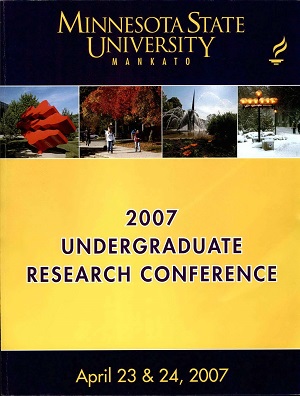Christian Influence on Roman Law Pertaining To Judaism
Location
CSU 202
Start Date
24-4-2007 10:45 AM
End Date
24-4-2007 12:30 PM
Student's Major
History
Student's College
Social and Behavioral Sciences
Mentor's Name
Margaretta Handke
Mentor's Department
History
Mentor's College
Social and Behavioral Sciences
Description
In the fourth and fifth centuries C.E. of the Roman Empire it is commonly accepted that a major shift in legal, economic and social status occurred among the religious bodies of the state. These statements usually reflect the idea that as Christianity grew in acceptance and power in the state, the legal rights of its Jewish citizens diminished. This research attempts to identify if there was a direct correlation between the gain of the Christians and the loss of the Jews. I would contend that such changes in the law were actually a reflection of the emperors' Christian beliefs and not a reflection of the growing influence of the early church fathers and while the laws were a response to the growing political Christian influence, they were more likely politically expedient maneuvers than overall anti-Semitism. This research will consider the (1) writings of the early church fathers to determine the degree of influence those writings appear to have made upon the emperors' legislation; (2) biographical information on the emperors reigning from Constantino to Theodosius II to determine the degree of Christian orthodoxy portrayed in their lives; and (3) the language of the Codex Theodosian, specifically XVI, Title 8: "Jews, Caelicolists, and Samaritans" and XVI, Title 9: "No Jew shall have a Christian slave", to examine the actual implementation of legislation based upon any correlations found.
Christian Influence on Roman Law Pertaining To Judaism
CSU 202
In the fourth and fifth centuries C.E. of the Roman Empire it is commonly accepted that a major shift in legal, economic and social status occurred among the religious bodies of the state. These statements usually reflect the idea that as Christianity grew in acceptance and power in the state, the legal rights of its Jewish citizens diminished. This research attempts to identify if there was a direct correlation between the gain of the Christians and the loss of the Jews. I would contend that such changes in the law were actually a reflection of the emperors' Christian beliefs and not a reflection of the growing influence of the early church fathers and while the laws were a response to the growing political Christian influence, they were more likely politically expedient maneuvers than overall anti-Semitism. This research will consider the (1) writings of the early church fathers to determine the degree of influence those writings appear to have made upon the emperors' legislation; (2) biographical information on the emperors reigning from Constantino to Theodosius II to determine the degree of Christian orthodoxy portrayed in their lives; and (3) the language of the Codex Theodosian, specifically XVI, Title 8: "Jews, Caelicolists, and Samaritans" and XVI, Title 9: "No Jew shall have a Christian slave", to examine the actual implementation of legislation based upon any correlations found.
Recommended Citation
Dauer, Skye A.. "Christian Influence on Roman Law Pertaining To Judaism." Undergraduate Research Symposium, Mankato, MN, April 24, 2007.
https://cornerstone.lib.mnsu.edu/urs/2007/oral-session-12/5




